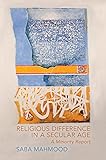Religious Difference in a Secular Age : A Minority Report / Saba Mahmood.
Material type: TextPublisher: Princeton, NJ : Princeton University Press, [2015]Copyright date: ©2016Edition: Pilot project. eBook available to selected US libraries onlyDescription: 1 online resource (248 p.)Content type:
TextPublisher: Princeton, NJ : Princeton University Press, [2015]Copyright date: ©2016Edition: Pilot project. eBook available to selected US libraries onlyDescription: 1 online resource (248 p.)Content type: - 9780691153285
- 9781400873531
- 322/.10962 23
- BL2460 .M34 2016
- online - DeGruyter
- Issued also in print.
| Item type | Current library | Call number | URL | Status | Notes | Barcode | |
|---|---|---|---|---|---|---|---|
 eBook
eBook
|
Biblioteca "Angelicum" Pont. Univ. S.Tommaso d'Aquino Nuvola online | online - DeGruyter (Browse shelf(Opens below)) | Online access | Not for loan (Accesso limitato) | Accesso per gli utenti autorizzati / Access for authorized users | (dgr)9781400873531 |
Browsing Biblioteca "Angelicum" Pont. Univ. S.Tommaso d'Aquino shelves, Shelving location: Nuvola online Close shelf browser (Hides shelf browser)

|

|

|

|

|

|

|
||
| online - DeGruyter Adam Smith : His Life, Thought, and Legacy / | online - DeGruyter Currency Power : Understanding Monetary Rivalry / | online - DeGruyter Building the Land of Dreams : New Orleans and the Transformation of Early America / | online - DeGruyter Religious Difference in a Secular Age : A Minority Report / | online - DeGruyter The Mushroom at the End of the World : On the Possibility of Life in Capitalist Ruins / | online - DeGruyter Political Turbulence : How Social Media Shape Collective Action / | online - DeGruyter Reconceiving Infertility : Biblical Perspectives on Procreation and Childlessness / |
Frontmatter -- CONTENTS -- ACKNOWLEDGMENTS -- NOTE ON TRANSLATION AND TRANSLITERATION -- INTRODUCTION -- PART I -- Chapter 1. MINORITY RIGHTS AND RELIGIOUS LIBERTY: ITINERARIES OF CONVERSION -- Chapter 2. TO BE OR NOT TO BE A MINORITY? -- PART II -- Chapter 3. SECULARISM, FAMILY LAW, AND GENDER INEQUALITY -- Chapter 4. RELIGIOUS AND CIVIL INEQUALITY -- Chapter 5. SECULARITY, HISTORY, LITERATURE -- EPILOGUE -- BIBLIOGRAPHY -- INDEX
restricted access online access with authorization star
http://purl.org/coar/access_right/c_16ec
The plight of religious minorities in the Middle East is often attributed to the failure of secularism to take root in the region. Religious Difference in a Secular Age challenges this assessment by examining four cornerstones of secularism-political and civil equality, minority rights, religious freedom, and the legal separation of private and public domains.Drawing on her extensive fieldwork in Egypt with Coptic Orthodox Christians and Bahais-religious minorities in a predominantly Muslim country-Saba Mahmood shows how modern secular governance has exacerbated religious tensions and inequalities rather than reduced them. Tracing the historical career of secular legal concepts in the colonial and postcolonial Middle East, she explores how contradictions at the very heart of political secularism have aggravated and amplified existing forms of Islamic hierarchy, bringing minority relations in Egypt to a new historical impasse. Through a close examination of Egyptian court cases and constitutional debates about minority rights, conflicts around family law, and controversies over freedom of expression, Mahmood invites us to reflect on the entwined histories of secularism in the Middle East and Europe.A provocative work of scholarship, Religious Difference in a Secular Age challenges us to rethink the promise and limits of the secular ideal of religious equality.
Issued also in print.
Mode of access: Internet via World Wide Web.
In English.
Description based on online resource; title from PDF title page (publisher's Web site, viewed 29. Jul 2021)


